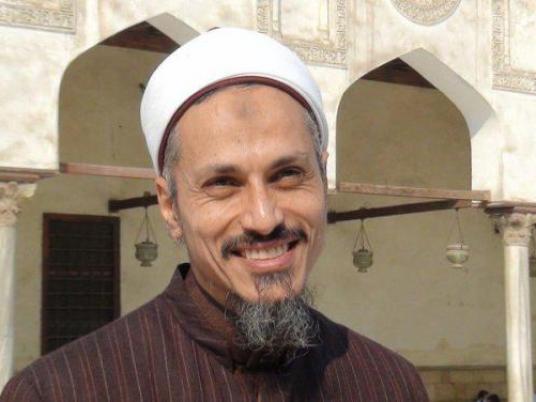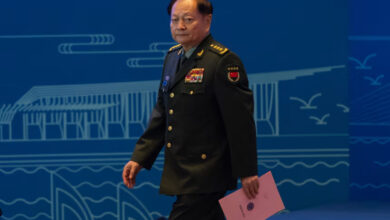
Sheikh Emad Effat, who was killed at the age of 52 on Friday by military police with a gunshot to his heart, was a revolutionary Islamic scholar who affected the lives of hundreds of students he tutored and taught at Al-Azhar Mosque and Dar al-Iftaa, the Muslim world’s premier institution for legal research.
Effat was killed in Tahrir Square when military police violently cracked down on a sit-in by the cabinet building. His family and students suspect that he may have been targeted because of his criticism of the ruling military council and, most importantly, due to his last fatwa, which forbade voting for parliamentary candidates associated with the Mubarak regime and former members of the dissolved National Democratic Party. Effat based that edict on the fact that regime remnants seek to subvert Egypt’s future through bribery and patronage following the revolution.
News of his death fell like a lightning bolt on hearts of his family members and students. However, they hope that his murder will further the cause of the revolution.
“Our heart is bleeding from the departure of Effat. We plan to pursue all avenues, not only to hold his killers accountable, but also to achieve all that he wanted when he went down to Tahrir, and that is to reclaim the nation for its people and to free it from its enemies,” his family said in a statement released on Saturday.
“We won’t rest until these supreme goals are met, for which his blood and that of other martyrs was shed.”
According to Effat’s wife and students, he had longed for martyrdom over the past 30 years. His e-mail is even called “shaheed_elazhari” (Al-Azhar martyr).
“He initially wanted to die while liberating Jerusalem from the hands of Israelis, but then when Egypt’s revolution erupted, he wished to be martyred in Egypt because those who kill their own people are not considered Muslims,” read the statement.
On Saturday, thousands of mourners attended his funeral at Al-Azhar mosque, including Al-Azhar officials, politicians, Christian leaders, and his students. The mourners chanted against military rule and called for the execution of Field Marshall Hussein Tantawi, head of the ruling Supreme Council of the Armed Forces.
Effat was born in Giza Governorate to Ahmed Effat, a calligrapher. He is survived by his wife, Nashwa Abdel Tawwab, a journalist at Al-Ahram Weekly newspaper.* He was one of four children. Effat obtained a BA with honors in Arabic Language from the Faculty of Arts at Ain Shams University in 1991. In the late 1990s, he also obtained a Bachelor of Sharia (Islamic Law) and a Diploma in Islamic Jurisprudence from the Faculty of Sharia and Law at Al-Azhar University.
The Al-Azhar Sheikh was the director of fatwas, religious edicts, at Dar Al-Iftaa since 2003. He also worked as a Sharia researcher at the House of Authentication of Religious Studies and a researcher at MSX International Programming Company.
His research focused on Islamic jurisprudence and Sharia, in particular the Shafi’i school of thought in Sunni Islam. However, he has immense knowledge in Quran, Sunna, Sufism, monotheism, Hadith, and Arabic grammar and rhetoric.
At the start of his academic career, Effat adhered to the ultraconservative Salafi doctrine, but in his 20s, he later shifted toward a more moderate approach, rejecting literalism and advocating for a pragmatic approach to religion to modern society.
Effat, now known as the Revolution’s Sheikh, had always spoken up against injustice and was one of the few revolutionaries who defied the conservative Al-Azhar and Dar Al-Ifta, which had long supported the regime and is now trying to distance itself from politics. He opposed former President Hosni Mubarak’s dictatorship and even predicted the fall of Mubarak three months before the latter stepped down.
“He [Effat] assured me that the travel ban that the regime had put on me would be lifted soon, and when I wondered how this could happen, he said Mubarak won’t last until April 2011,” said Ibrahim al-Houdaiby, one of his students, whose great-grandfather and grandfather led the once-banned Muslim Brotherhood. Houdaiby, who is also a former Muslim Brother, had known Effat for three years and was in contact with him on a daily bases during his last days.
Effat was at the front line of clashes between protesters and security forces in Tahrir Square since the first day of the revolution on 25 January, said Houdaiby.
“I can smell the scent of paradise from a distance in Tahrir Square,” Effat used to say to his friends.
Houdaiby remembers that once they were praying together in a mosque and Effat was angered when the Imam prayed for Mubarak. Effat said that an imam or sheikh who prays for a person who humiliates his citizens is not worthy of his position.
Effat had not missed a protest or a sit-in in Tahrir Square over the past eleven months. However, he would always take off his turban and kaftan, the uniform of Al-Azhar sheikhs, before going to the protests in order not to embarrass the institution of Dar Al-Ifta, whose head and Grand Mufti of Egypt Ali Gomaa prefers to distance religion from politics.
“I once asked him [Effat] the reason why he was not wearing his Islamic outfit in Tahrir, and he said that he was there as a normal citizen who only represents himself and not Al-Azhar or Dar Al-Ifta,” said Houdaiby.
Despite his great knowledge, Effat never liked the spotlight or media attention during his lifetime, which is why his face was unknown to the public. Now, after his death, pictures of his angelic smiling face are being shared among thousands of people on social media and his image has been painted on a wall in Tahrir Square, next to location where he was shot.
He was known for his decent and humble manner in dealing with people, even with those less knowledgeable than him. Despite his high level of education, you could find him in Tahrir Square, standing alone calmly, sometimes cleaning the street.
He used to sit in a corner after prayers in Sultan Hassan Mosque as three or four people gathered around him seeking his knowledge, while much younger and less experienced Sheikhs would sit in the middle of hundreds, said Houdaiby. “He was selfless.”
*Correction: This article originally stated that Abdel Tawwab is Effat's mother. She is his wife.




